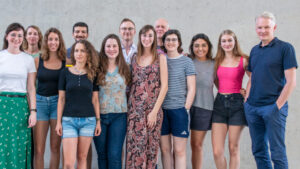

Romagnani lab
Identifying innate signals initiating and perpetuating chronic inflammation
Innate Immunity
Chronic inflammatory disorders, especially rheumatic diseases, are triggered and maintained by effector mediators produced by the adaptive immune system, such as T cell and B cells. In T cells, inflammatory programs are induced by the T cell receptor (TCR) in conjunction with distinct cytokines and/or environmental signals. Recently, it appeared evident that emerging innate cell subsets lacking the TCR and collectively known as innate lymphoid cells (ILCs), exhibit a similar heterogeneity of effector modules, which can be activated in the course of inflammation. The signals and innate receptors instructing the different effector programs and their execution in ILCs remain largely unknown. Such innate sensors could also enhance effector functions in T cells, thus promoting inflammation in a TCR-independent fashion. Therefore, our main research focus is devoted to study the innate modules and triggers employed by ILCs and T cells to initiate and maintain inflammation in a TCR-independent fashion and to understand whether distinct inflammatory programs can be imprinted in ILCs to promote rheumatic diseases.
Recently, we have described a specific recognition strategy by Natural Killer (NK) cells which, in the absence of rearranged receptors, can detect mutated peptides derived from virus and host. Specific peptide recognition drives activation and expansion of a specialized subset of adaptive NK cells and contributes to determine their imprinting of pro-inflammatory cytokines. This data have important implications for our understanding of non-self and self-recognition by lymphocytes and how its dysregulation can lead to loss of tolerance and autoimmunity. Our data also indicate that innate activating receptors, such as NKG2D, also regulate Th1/Th17 cell-mediated responses in arthritis, thereby identifying innate activating receptors as potential check points and therapeutic targets for inflammatory diseases.
Altogether, the identification of the innate triggers and the specific signals driving the acquisition and the stable imprinting of distinct inflammatory programs in ILCs and T cells will be important to develop potentially new targets for the amelioration of chronic inflammation in rheumatic diseases.
Keywords
Chronic inflammation
Innate lymphoid cells
Innate receptors
Epigenetic imprinting

Group leader
Prof. Chiara Romagnani, MD, Phd
Scientists
Dr. Christina Stehle
Dr. Timo Rückert
Dr. Daniela Carolina Hernández
Ph.D. students
Nils Müller
Christoforos Dimitropoulos
Oliver Knight
Alexandra Forrai
Klara Penkert
Ramon Ranka
Maximilian Mandry (MD/PHD Student)
Technician
Marion Klemm
- Leif Ludwig, Max Delbrück Center for Molecular Medicine Berlin
- Caleb Lareau, Stanford University
- Boian Polic, University of Rijeka
- Michael Birnbaum, Massachusetts Institute of Technology, Cambridge, Massachusetts, United States
- Martin Messerle, Hannover Medical School
- Thomas Schüler, Otto-von-Guericke-Universität Magdeburg
- Hernández-Torres DC, Stehle C. Embryonic ILC-poiesis across tissues. Front Immunol. 2022 Dec 20;13:1040624. doi: 10.3389/fimmu.2022.1040624. PMID: 36605193; PMCID: PMC9807749.
- Müller NC, Romagnani C. To kill or not to kill – The role of the tumor microenvironment in shaping group 1 ILC functions. Semin Immunol. 2022 Nov;61-64:101670. doi: 10.1016/j.smim.2022.101670. Epub 2022 Nov 10. PMID: 36372017; PMCID: PMC7613863.
- Rückert T, Lareau CA, Mashreghi MF, Ludwig LS, Romagnani C. Clonal expansion and epigenetic inheritance of long-lasting NK cell memory. Nat Immunol. 2022 Nov;23(11):1551-1563. doi: 10.1038/s41590-022-01327-7. Epub 2022 Oct 26. PMID: 36289449; PMCID: PMC9663309.
- Rückert T, Romagnani C. A natural killer’s hike through epigenetic landscapes. Sci Immunol. 2021;
- Stehle C, Rückert T, Fiancette R, Gajdasik DW, Willis C, Ulbricht C, et al. T-bet and RORα control lymph node formation by regulating embryonic innate lymphoid cell differentiation. Nat Immunol. 2021;
- Hernández DC, Juelke K, Müller NC, Durek P, Ugursu B, Mashreghi MF, et al. An in vitro platform supports generation of human innate lymphoid cells from CD34+ hematopoietic progenitors that recapitulate ex vivo identity. Immunity. 2021;54(10):2417-2432.e5.
- Cossarizza A, … Romagnani C,… Zychlinsky A. Guidelines for the use of flow cytometry and cell sorting in immunologicalstudies (second edition). Eur J Immunol. 2019 Oct;49(10):1457-1973.
- Hammer Q, Rückert T, Romagnani C.Natural killer cell specificity for viral infections. Nat Immunol. 2018 Aug;19(8):800-808.
- Hammer Q, Rückert T, Borst EM, Dunst J, Haubner A, Durek P, Heinrich F, Gasparoni G, Babic M, Tomic A, Pietra G, Nienen M, Blau IW, Hofmann J, Na IK, Prinz I, Koenecke C, Hemmati P, Babel N, Arnold R, Walter J, Thurley K, Mashreghi MF, Messerle M, Romagnani C. Peptide-specific recognition of human cytomegalovirus strains controls adaptive natural killer cells. Nat Immunol. 2018 May;19(5):453-463.
- Stehle C, Hernández DC, Romagnani C.Innate lymphoid cells in lung infection and immunity. Immunol Rev. 2018 Nov;286(1):102-119.
- Babic M, Romagnani C.The Role of Natural Killer Group 2, Member D in Chronic Inflammation and Autoimmunity. Front Immunol. 2018 May 30;9:1219.

 Deutsch
Deutsch

